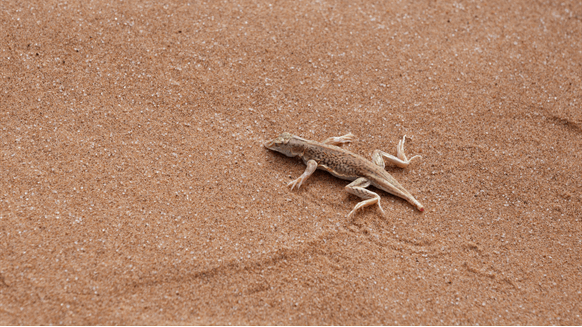
In a statement posted on its website, the Texas Railroad Commission (RRC) highlighted that the U.S. Department of Fish and Wildlife Services (USFWS) announced that it would be listing the Dune Sagebrush Lizard (DSL) as an endangered species under the Endanger Species Act (ESA).
The RRC noted in its statement that the Biden administration made this designation “despite years of public and private collaborative efforts protecting the lizard, which have resulted in increased land conservation and rebounding populations”.
“This doesn’t have a thing to do with ‘saving lizards’, it’s about shutting down U.S. oil and gas production to win political brownie points, which will only increase inflation and jeopardize billions of lives globally,” RRC Commissioner Wayne Christian said in the statement.
“It doesn’t matter if it’s a lizard, a chicken, a whale, or a unicorn, radical environmentalists won’t be satisfied until we all get our energy from firewood and are living in a cave again,” he added.
“To them, this is about ending fossil fuels to ‘better humanity’, which is ironic given they allow mankind to flourish by powering 80 percent of the globe’s energy, manufacturing 96 percent of consumer products, and helping to feed more than half the planet,” he continued.
“Right now, the world needs more energy and more Texas oil and gas, and all this does is drive up prices and make it harder on consumers,” Christian warned.
In the statement, Christian said “Texas will certainly fight this most recent ESA weaponization, which aims to shut down half the nation’s crude oil production and one-third of its natural gas production”.
“Texans can rest assured that the RRC and other state agencies won’t lift a finger to help with this nonsense, because the Texas Energy Independence Act prohibits state agencies from facilitating any effort that would undermine Texas oil and gas production,” he went on to state.
The statement highlighted that Christian had sent a letter to the USFWS back in September last year opposing the ESA designation.
In that letter, Christian said “this proposed designation does little to protect the DSL population and will do more harm to domestic energy production in the Permian Basin, the State of Texas, and our nation”.
Rigzone has asked the USFWS and the White House for comment on the RRC statement and Christian’s letter. At the time of writing, neither department has responded to Rigzone yet.
The USFWS stated that it is listing the DSL as an endangered species under the ESA in a release posted on its site last Friday. The organization said the decision comes “after a rigorous review of the best available scientific and commercial information, a 90-day public comment period, and a public hearing and information session”.
“The designation of critical habitat was found to be prudent but not determinable at this time. The service has up to one year from the time of listing to propose critical habitat,” it added.
In the release, USFWS Southwest Regional Director Amy Lueders said, “the Endangered Species Act is an important tool in preventing the extinction of imperiled species like the Dunes Sagebrush Lizard”.
“The service will continue working collaboratively with Tribes, industry, stakeholders, and private landowners while ensuring protections for the lizard and its habitat,” Lueders added.
The USFWS noted in the release that the DSL is a rare species found only in the shinnery oak and sand dune ecosystems in extreme southeast New Mexico and west Texas. The lizard occurs in about four percent of lands that make up the 86,000 square mile Permian Basin, the USFWS said in the statement, adding that primary threats to the lizard include loss of habitat associated with oil and gas development, sand mining, and changing climate.
The release highlighted that, in New Mexico and Texas, around 100 ranchers and 100 oil and gas partners have enrolled in voluntary agreements “to implement conservation practices that address specific threats with assurances that if the species is listed, they can continue to manage their land outlined in their agreements with no additional requirements or restrictions”.
“In New Mexico, these voluntary enrollments cover nearly 85 percent of the Dune Sagebrush Lizard’s range within the state. In Texas, enrollment focuses on avoiding and mitigating any unavoidable impacts on lizard habitat,” the release stated.
“Although new enrollment in these voluntary agreements ends when the listing rule is final and effective, the service has multiple tools and programs to work with industry, private landowners, and public agencies to streamline and ensure compliance with the ESA,” it added.
“In addition, through advanced horizontal drilling techniques, oil and gas wells are still able to reach most oil and gas reserves without disrupting lizard habitat,” it continued.
The USFWS highlighted that the final rule is effective 30 days after posting in the Federal Register.



